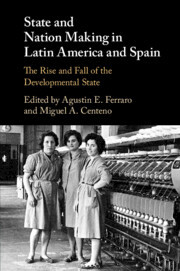State and Nation Making in Latin America and Spain: Volume 2 The Rise and Fall of the Developmental State
Langue : Anglais
Coordonnateurs : Ferraro Agustin E., Centeno Miguel A.

This book analyzes how developmental states contributed to economic prosperity, sometimes with spectacular success, and sometimes with less brilliant results.
In 1960, Latin America and Spain had the same level of economic and social development, but, in just twenty years, Spain raced ahead. This book provides an in-depth analysis of the design and implementation of developmental state policies in both regions and examines the significant variance in success between Latin America and Spain. The second volume in a trilogy, this collection of studies on state institutions in Latin America and Spain covers the period 1930-1990 and focuses on the successes and failures of the developmental states. This book assumes a wide social science perspective on the phenomenon of the developmental state, focusing on the design, creation and management of public institutions, as well as the creation of national projects and political identities related to development strategies.
Part I. Introduction: 1. Those were the days. The Latin American economic and cultural boom vs. the Spanish miracle Miguel A. Centeno, Agustin E. Ferraro and Vivekananda Nemana; Part II. Visions and Politics of Development: 2. CEPAL as idea factory for Latin American development. Intellectual and political influence 1950–90 Joseph Love; 3. The arc of development. Economists and sociologists' quest for the state Margarita Fajardo; 4. From 'showcase' to 'failure'. Democracy and the Colombian developmental state in the 1960s Robert Karl; Part III. Institutional Design: Infrastructural and Territorial Power: 5. One blueprint, three translations: Corporaciones de Fomento in Colombia, Chile and Peru José Carlos Orihuela; 6. The rise and fall of the Instituto Nacional de Planificación in Peru (1962–92): exploring the limits of state capacity building in weak states Eduardo Dargent; 7. A double-edged sword: the institutional foundations of the Brazilian developmental state, 1930–85 Luciana de Souza Leão; 8. Life is a dream. Bureaucracy and industrial development in Spain, 1950–90 Agustin E. Ferraro and Juan José Rastrollo; Part IV. Industry, Trade and Growth: Economic Power: 9. Emergence and maturity of the developmental state in Argentina, Brazil and Spain, 1930–90. An economic history approach Jordi Catalan and Tomàs Fernández-de-Sevilla; 10. The Mexican developmental state, c.1920–c.1980 Alan Knight; 11. The developmental state and the agricultural machinery industry in Argentina Yovanna Pineda; 12. The Chilean developmental state. Political balance, economic accommodation, and technocratic insulation 1924–1973 Patricio Silva; Part V. National and Civic Identities: Symbolic Power: 13. The developmental state and the rise of popular nationalism: cause, coincidence, or elective affinity? Matthias vom Hau; 14. State, nation, and identity in Brazil, 1930–2000 Marshall Eakin; 15. Urban informality, citizenship, and the paradoxes of development Brodwyn Fisher; Part VI. Conclusion: 16. Authoritarianism, democracy, and development in Latin America and Spain 1930–1990 Agustin E. Ferraro and Miguel A. Centeno.
Agustin E. Ferraro has worked in diverse public policy fields for governments, NGO's and international organizations. As a Humboldt scholar 2001–2003, he did postdoctoral research at the Institute for Latin American Studies in Hamburg, and at the London School of Economics and Political Science (LSE). In 2009, he won a prestigious national award in Spain (INAP) for original research on state institutions in Latin America.
Miguel Angel Centeno is Professor of Sociology and International Affairs at Princeton University. He is well known for his work on Latin America, state capacity, war, and globalization.
Miguel Angel Centeno is Professor of Sociology and International Affairs at Princeton University. He is well known for his work on Latin America, state capacity, war, and globalization.
Date de parution : 01-2024
Ouvrage de 450 p.
Date de parution : 12-2018
Ouvrage de 448 p.
15.7x23.4 cm
Disponible chez l'éditeur (délai d'approvisionnement : 14 jours).
Prix indicatif 141,33 €
Ajouter au panierThème de State and Nation Making in Latin America and Spain: Volume 2 :
© 2024 LAVOISIER S.A.S.



